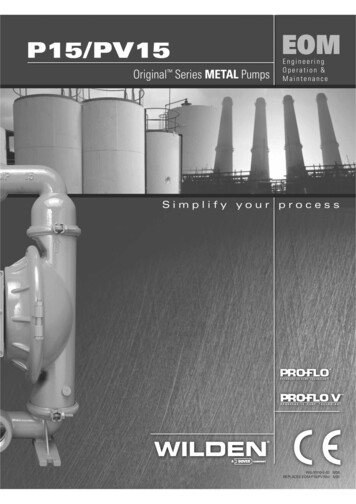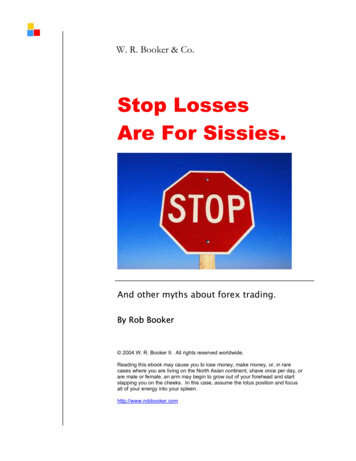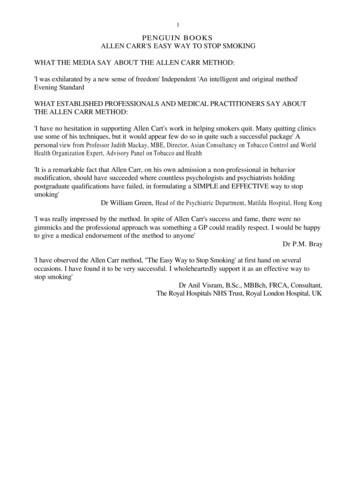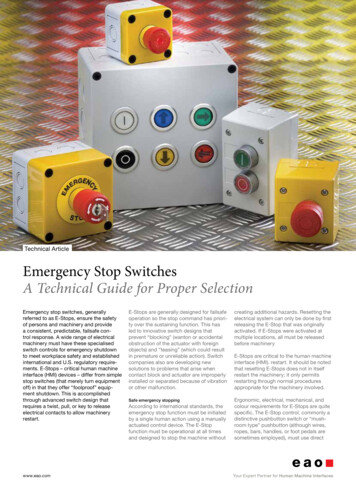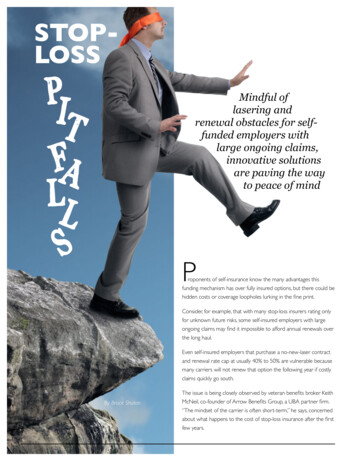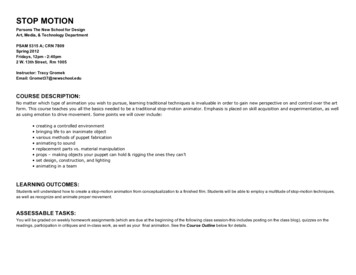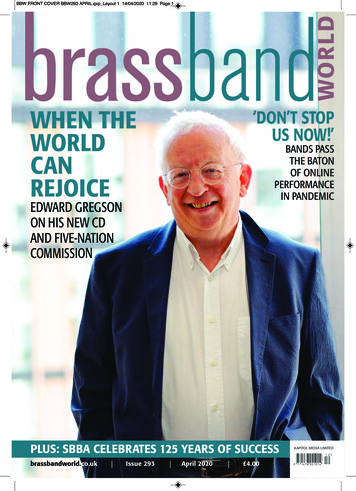
Transcription
BBW FRONT COVER BBW293 APRIL.qxp Layout 1 14/04/2020 11:29 Page 1WHEN THEWORLDCANREJOICE‘DON’T STOPUS NOW!’BANDS PASSTHE BATONOF ONLINEPERFORMANCEIN PANDEMICEDWARD GREGSONON HIS NEW CDAND FIVE-NATIONCOMMISSIONPLUS: SBBA CELEBRATES 125 YEARS OF SUCCESSbrassbandworld.co.ukIssue 293April 2020 4.00
Page 12-15 The BBW Interview BBW293 APRIL.qxp Layout 1 15/04/2020 16:08 Page 1The BBW InterviewWHEN THE WORLDCAN REJOICE AGAIN!If it makes its planned September British Open Championships première, composer Edward Gregson’s test-piece,The World Rejoicing, may be the perfect antidote to Covid-19 that has brought the World some of its darkest days.Christopher Thomas caught up with the composer, whose towering creative oeuvre shows no signs of diminishingwith age in his 75th birthday year and whose latest CD, Music of the Angels, has just been released on the Chandos label“This is a remarkably individual composerwho writes in the mainstream of 20th CenturyEnglish music He proves a superb craftsman,with great orchestral flair and genuine melodic gifts– Ivan March, Gramophone, November 2003Many of us will remember the first time that we heard a work by EdwardGregson. For me, it was the pieces that I played - Essay, Prelude for anOccasion and The Plantagenets –- during some of my very first bandrehearsals, later followed by Connotations, a work that remains seminal to therepertoire since Black Dyke’s famous National Championships victory on thepiece in 1977. Connotations proved to herald the dawn of a new era in brassband music, yet 43 years on it is testimony to Gregson’s towering creativeintellect that the work gleams as brightly as ever in its vitality and life-affirmingradiance.Since then, and in addition to his distinguished career in academia, alongwith his significant output of literature for the orchestral, chamber, instrumentalchoral and wind genres, Edward Gregson has written a steady, but thoughtfullymeasured flow of major works for the brass band and instrumental genre, forwhich his music provides a rich seam through the core of the brass repertoireof the last 50 years. His works represent a contemporary backbone to theoeuvre that spans every sub-genre of music for brass, including brass band,symphonic ensemble, concerti and chamber music. Moreover, EdwardGregson’s sheer passion and indomitable support of brass bands, through hisroles in academia, have formed a hugely important additional element to hiscontribution, which sits proudly alongside his immeasurable importanceglobally as a composer.Celebrating his 75th birthday in July, Edward Gregson’s creative energiesburn as powerfully as ever and his latest work for brass band, The WorldRejoicing, Symphonic Variations on a Lutheran Chorale, is due to be unveiledat the British Open in September as part of a five-nation, cross-collaborativetest-piece commission. It is the source of that energy and inspiration that I putto the composer as we opened what proved to be a fascinating, enlighteningand in-depth conversation.“I’ve always been fortunate in having a lot of energy and I think it probablycomes from doing a cross-section of things. Given that it’s impossible to12 brassbandworld.co.ukEdward Gregson
Page 12-15 The BBW Interview BBW293 APRIL.qxp Layout 1 15/04/2020 16:08 Page 2The BBW Interview“support oneself purely from writing classical music,for the most of my life I’ve had two jobs. For some,like Malcolm Arnold and Richard Rodney Bennett,who combined writing film music alongside artmusic; others have been performers and a fewconductors. For me, it was academia, initially inLondon and latterly, from 1996, in Manchesterwhen I was appointed as the Principal of the RoyalNorthern College of Music (RNCM). However,having a split role in life has never diminished myurge to write music and although you have tosacrifice a lot to keep the two things going, not ayear has gone by when I haven’t written at leastone major piece.”As Edward points out, his retirement from theRNCM in 2008 was something of a watershed, injourney through life might take us to far awaycountries and to witness inspirational sights, but it isalways that inner urge that burns and that is whatkeeps me writing.”In terms of his music for symphonic brass andchamber forces, that inner urge is magnificentlyencapsulated in Music of the Angels, the mostrecently minted CD of Edward Gregson’s music onthe Chandos label and a disc that is not only aglorious retrospective of music spanning a period ofexactly 50 years, but one that also reads like a‘who’s who’ in terms of the performers. It’s anaspect about which Edward exudes enthusiasm.“Even for a hardened old ‘pro’ like me, that reallywas quite extraordinary. Simply to have a team ofmainly London professionals of that quality,Recording his latest CD, Music of the Angels - Works for Symphonic Brass and Percussion,performed by London Brass and guests directed by Rumon Gamba, out now on the Chandos label!terms of gaining more personal time that allowedhim to focus on composition more fully alongsidecontinuing roles with organisations such as thePerforming Rights Society (PRS). His creativeinspiration seems greater than ever and majorworks have continued to flow, recent monthshaving brought the première of his Oboe Concertoby the BBC Philharmonic Orchestra.He elaborates: “Inspiration is a difficult word forcomposers to make sense of. For me, inspiration isan inner urge to create. When I taught compositionat Goldsmith’s College in London, I always told mystudents that composers are born and not made.And that inner urge has always been with me. I’veheard many clichéd comments over the yearsabout composers being inspired by the countryside,or by sitting in front of a Norwegian fjord, but thatkind of thing doesn’t make any difference. Thetogether in one place and at one time, wasremarkable. The horn section alone featured thefinest players in Britain, including MichaelThompson, who recorded my Horn Concerto manyyears ago, and Richard Watkins who has alsorecorded the Concerto in its orchestral version. Theconnections run deep; for instance, Richard Watkinsstudied with Ifor James, who had a strongconnection with Besses o’ th’ barn Band. Add tothat stunning trombone and trumpet sections, andwhen they started playing we simply thought ‘Wow,we’ve never heard symphonic brass playing likethis’. With the players of London Brass, one can stillsense that legacy and tradition passed down fromthe days of the Philip Jones Brass Ensemble.”Indeed, there is a direct link to the Philip JonesBrass Ensemble in the form of Eddie’s 1967Quintet for Brass, written as the composer’sReceiving an Ivors Composer Award in 2019 forThe Salamander and the Moonrakergraduation piece at the Royal Academy of Musicand dedicated to the Philip Jones Brass Ensemble,about which he observed: “I was always proud ofthe fact that the ‘Quintet’ won the Frederick CorderMemorial Prize for the Best Piece by a GraduatingComposer, up against the likes of Paul Patterson,Brian Ferneyhough and John Tavener. Tavener wastwo years older than me and, by that point, alreadya prodigiously talented composer.”That early ‘Quintet’ is given a reading ofinvigorating energy and atmosphere on the newCD, and although written at the age of just 22,the harmony, thematic invention and intervallicstructure are recognisably Gregson’s, so I was keento discover if he had been aware that he found hispersonal style and language so early in his creativelife. “I think people talk about style and languagetogether, when they are actually quite separateentities. For me, style is what makes a particularcomposer recognisable. Language is the technicalmeans by which we get there; for instance the12-tone system or aleatoricism. I was actually quiteinfluenced by Hindemith and Bartok, and I thinkthat in the ‘Quintet’, Hindemith is particularlyevident in my use of quartal harmony, which I washeavily into at the time. However, my style wasemerging at that point and I think you can still heartraces of the ‘Quintet’ in my music today.”One also senses that there has been anever-evolving sophistication of Gregson’s essentialstyle –- a further refinement of the corecompositional elements that, allied to the use of selfquotation and, to some degree, stylistic crossreferencing have further defined a composer whosemusic has always been immediately recognisable.He commented: “Self-quotation is something thathas come along in more recent years. In my earlybrassbandworld.co.uk 13PHOTO: MARK ALLENInspiration is a difficult word for composers to make sense of.For me, inspiration is an inner urge to create – Edward Gregson
Page 12-15 The BBW Interview BBW293 APRIL.qxp Layout 1 15/04/2020 16:08 Page 3The BBW InterviewTuba Concerto, I quote the Vaughan Williams Tuba Concerto, but that seemed anobvious thing to do, given that there were so few tuba concertos around at thatpoint. Later, I used both self-quotation and what I would call style conversion inpieces such as Of Distant Memories, in which I’m not writing in my own style, oreven my own language. From the point of view of language, I’ve dabbled inserialism, aleatoric techniques and minimalism over the years, but if you comparethat to Stravinsky, for instance; his language changed radically over time, but itwas still clearly Stravinsky. So although my language has varied, I don’t feel thatmy style has really changed since those early years. That said; it’s probably forother people to judge because, as a composer, it’s hard to see what one’s ownstyle really is.”Our conversation turns to the Symphony in Two Movements –- a work witha gritty, astringent edge that is as rigorous in its intellect, as it is in itsformidable architectural structure. It is a tour-de-force of a piece and isbrilliantly performed on the CD by the augmented forces of London Brass. Iput it to Edward that I regard it as his ‘magnum opus’ for the genre –- a pointon which he mused with interest: “I have to make a distinction here betweenmy writing for brass bands and my writing for other forces. I still think that,throughout my career, I’ve softened my language when I’ve written for brassbands. For instance, I wrote my Concerto for Orchestra in 1983, around thesame time as Dances and Arias. There are elements of Dances and Arias in“I have to make a distinction here betweenmy writing for brass bands and my writingfor other forces. I still think that, throughoutmy career, I’ve softened my language whenI’ve written for brass bands – Edward GregsonAt the 2020 RNCM Festival of Brass for his A symphony in Two Movements andmagnificent concert work, An Age of Kings, inspired by Shakespeare’s Henry VI andperformed by Black Dyke Band with mezzo-soprano, directed by Professor Nicholas ChildsEdward at the 2020 RNCM Brass Band Festival reception to launch the five-nationcollaborative commission of The World Rejoicing – set for the SeptemberBritish Open Championship and the test-piece for the National Championshipsin The Netherlands, Switzerland, Belgium (all later this year) and Norway (2021)the ‘Concerto’, but the orchestral work is tougher; more astringent in itslanguage than Dances and Arias.” He elaborated: “It’s something that I oncediscussed with John McCabe, who had been quite upset and, at the sametime, somewhat amused by the furore surrounding the use of his Images atthe Regional Championships in 1983. The consequence is that he deliberatelysoftened his style considerably when he came to write Cloudcatcher Fellssome years later. Much the same can be said for very different reasons aboutShostakovich, and his fourth and fifth symphonies. But my own personaljourney was really the reverse of that. I wanted to write something that wasuncompromising, but which would be challenging for the National Youth BrassBands of Great Britain and Wales, both technically and intellectually. So Ithought of it as an extremely challenging concert piece and, in that respect, it ismuch more in line with my natural symphonic style. I do regard it as my bestpiece for brass and yet it is also the least played!”In what promises to be a bumper year of celebration, 2020 will also bring therelease of several further new recordings of Eddie’s music, which might now bedelayed due to Coronavirus. He explained: “We’ve already recorded a disc ofsolo piano music with Murray McLachlan, which I’m doing the final edits on, andwe have a recording of my string quartets booked in July at Stoller Hall inChetham’s School of Music. There’s also a recording of instrumental music bymembers of the BBC Philharmonic and Hallé orchestras and a further instalmentof my brass band music by Black Dyke, including the brass band version of myEuphonium Concerto with David Childs. So there’s a huge amount going on thatcould, sadly, now be in jeopardy whilst the current restrictions remain in place.”Given that Edward mentioned his Euphonium Concerto, I couldn’t help but14 brassbandworld.co.ukask him his thoughts on last year’s sensational recording of the piece on theChandos label by David Childs and he responded: “David’s playing wasfantastic. I can only describe him as a phenomenon. As a musician, he is thecomplete article and one would have thought that he’d been playing amongstthe players of the BBC Philharmonic for years. He has no problem, whatsoever,with adapting to a symphonic sound and every phrase is so beautifully shaped.He was also very clear that he wanted a symphonic work from me and notsimply a virtuosi showpiece, so that is what I wrote.”Discussion of the Euphonium Concerto brought us neatly to the workthat will be unveiled at the British Open in September, The World Rejoicing.Explaining how he arrived at the Lutheran chorale that forms the centralthread through the work, the composer explained: “When I was commissionedto write the piece, my first preoccupation was to write a piece of music andI was also very conscious of the fact that it will be played at five major contests,so audiences would hear
Tuba Concerto, I quote the Vaughan Williams Tuba Concerto, but that seemed an obvious thing to do, given that there were so few tuba concertos around at that point. Later, I used both self-quotation and what I would call style conversion in pieces such as Of Distant Memories, in which IÕm not writing in my own style, or even my own language .


